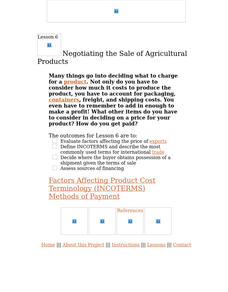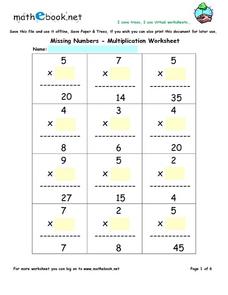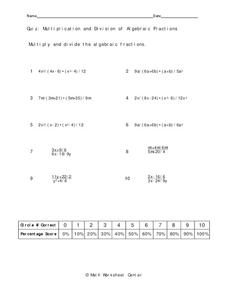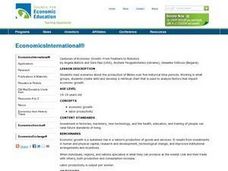Curated OER
Single Digit Multiplication Worksheet
In this multiplication worksheet, students find the product of 20 fill in the blank single digit multiplication problems with factors from 1 to 9.
Curated OER
Negotiating the Sale of Agricultural Products
Students evaluate factors affecting the price of exports, define INCOTERMS and describe the most commonly used terms for international trade, decide where the buyer obtains possession of a shipment given the terms of sale and assess...
Curated OER
Estimate Products: Reteach
In this estimating products worksheet, students review two steps to help estimate products. Students then estimate the products by rounding the factor greater than 10 to its greatest place.
Curated OER
Algebra Brackets
In this algebra brackets worksheet, students factor given equations. They multiply, divide, add, and subtract positive and negative numbers. This two-page worksheet contains 13 problems. Answers are provided.
Curated OER
Free Enterprise--Product Cost
Students apply basic math skills in computing a product cost.
Curated OER
Missing Numbers - Multiplication Virtual Worksheet
In this multiplication worksheet, students complete 72 vertical problems in which they find the second factor using the product and one factor. They can complete the worksheets online or print them out.
Curated OER
Grade 5 Math: Factorization 2
In this grade 5 math worksheet, 5th graders write 8 numbers as the product of their prime factors, using exponents to show multiples of the prime factor when needed.
Curated OER
Calculations with Hundreds and Thousands
In this multiplication worksheet, students multiply 24 problems involving hundreds and thousands. Students determine the correct number of zeros for the product of two factors.
Curated OER
What's the Fizz Factor: Mentos in Cola
In this what's the fizz factor: Mentos in cola worksheet, students conduct an experiment using Mentos in several kinds of diet cola and regular cola, writing the hypothesis, recording the results, and writing a conclusion.
Curated OER
Algebraic Fractions
For this algebraic fractions worksheet, 9th graders solve 10 different problems that include multiplying and dividing various fractions. First, they multiply the numerators then the denominators in each problem. Then, students cancel...
Curated OER
Disappearing Magic Factors
Learners identify, through the number of rows and columns, the factors related to the product. In turn, they also discover how to find the missing factor, which is part of the fact family for that product.
Bully Free Systems
Bully Free Lesson Plans—10th Grade
Two lessons, "What Does Cyber Bullying Look Like?" and "Factors Influencing My Reporting the Bullying of Others," serve as examples of the 12 included in a Bully Free curriculum. Each plan includes discussion questions, an activity, and...
EngageNY
Numbers in Exponential Form Raised to a Power
Develop an understanding of the properties of exponents through this series of activities. This third lesson of 15 explores the patterns associated with the power property. Scholars expand the powers before applying the property.
Chymist
Plop, Plop, Fizz, Fizz
One of the most recognizable commercial melodies was written in 1977, and led to gastronomical relief around the world. Scholars use Alka Seltzer tablets to measure reactants and calculate the chemical equation for the reaction of NaHCO3...
College Board
2001 AP® Macroeconomics Free-Response Questions
The European Union has had a profound effect on world economic dynamics. A structured inquiry investigates its impacts on global interest rates. Other authentic testing materials from College Board explore banking reserve requirements...
College Board
2016 AP® Macroeconomics Free-Response Questions
The debate of cupcake versus donuts may seem like a superficial one. However, learners consider whether it makes sense to specialize in producing only one confectionery in a scaffolded problem involving complicated economic concepts....
PHET
Area Model Introduction
Provide two views of multiplication. The introduction to an area model application has two modes. One mode shows the area of simple multiplication up to 12 by 12. The second mode shows how area models can be partitioned leading to the...
Curated OER
Centuries of Economic Growth: From Feathers to Robotics
Students read scenarios about the production of Bibles over five historical time periods. Working in small groups, students create skits and develop a retrieval chart that is used to analyze factors that impact economic growth.
Curated OER
What Is Actually Bought and Sold?
Economics students can use this packet to better grasp the concept of changes in supply and demand by reading about marketing, products, and elasticity. There are 3 tasks for students to complete, each based on the content of a...
Curated OER
Reverse Multiplication Tables- Find the Factors
In this reverse multiplication table instructional activity, 3rd graders find the factors that correspond with the products that are given in 10 arrays. They place the factors in the top row and first column of the grids.
Curated OER
Partial Products
Third graders study partial-products algorithms. In this math lesson, 3rd graders use an algorithm to find the product of factors. Students discuss the relationships between multiplication and division.
Illustrative Mathematics
Comparing Products
How can 5th graders show understanding that 30 x 225 is half of 60 x 225 without completing the computation? They can use an area model and draw it out. An array, or an open array, is an area model that allows for young learners to...
Curated OER
Sample Midyear Examination (Chemistry and Biology)
A 12-page midterm exam sample can be given to young scientists in preparation for an exam. This particular installment is geared toward a class that delves into both ecology and chemistry concepts. There is no way to separate the 50...
San Jose Unified School District
Multiplication Chart
Looking to support your young mathematicians with mastering their multiplication facts? Then this set of multiplication charts is a great place to start, allowing children to visualize the the relationships between factors and multiples.

























